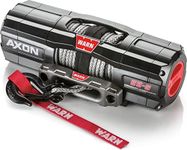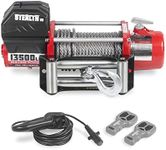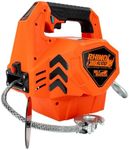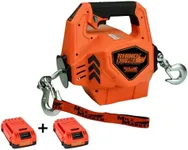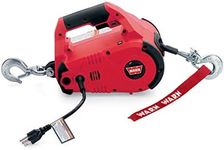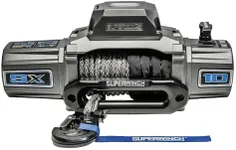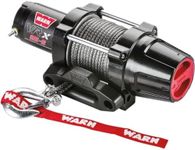Buying Guide for the Best Winches
When choosing a winch, it's important to consider the type of tasks you'll be using it for, the weight of the loads you'll be pulling, and the environment in which you'll be operating. Winches are essential tools for off-roading, towing, and various industrial applications, so selecting the right one can make a significant difference in performance and safety. Understanding the key specifications will help you make an informed decision that aligns with your needs.Load CapacityLoad capacity, often referred to as the winch's rated line pull, is the maximum weight the winch can safely pull. This is crucial because using a winch beyond its capacity can lead to equipment failure and safety hazards. Load capacities are typically segmented into light-duty (up to 4,000 lbs), medium-duty (4,000 to 8,000 lbs), and heavy-duty (over 8,000 lbs). To choose the right capacity, consider the weight of the vehicle or object you plan to pull, and add a safety margin of at least 1.5 times the weight to ensure the winch can handle the load comfortably.
Motor TypeWinches are powered by either electric or hydraulic motors. Electric winches are popular for their ease of installation and use, making them suitable for most recreational and light to medium-duty applications. Hydraulic winches, on the other hand, are more powerful and can operate continuously without overheating, making them ideal for heavy-duty and industrial use. When choosing a motor type, consider the frequency and intensity of your winching tasks. For occasional use, an electric winch is often sufficient, while frequent or heavy-duty use may require a hydraulic winch.
Line MaterialThe line material of a winch can be either steel cable or synthetic rope. Steel cables are durable, abrasion-resistant, and suitable for rugged environments, but they are heavier and can be dangerous if they snap. Synthetic ropes are lighter, easier to handle, and safer in case of breakage, but they require more maintenance and are susceptible to abrasion. Your choice should depend on the environment and frequency of use. For off-roading and situations where weight is a concern, synthetic rope is often preferred. For industrial or heavy-duty applications, steel cable might be more appropriate.
Line SpeedLine speed refers to how quickly the winch can spool the line in or out. This is important for efficiency and time management, especially in situations where speed is critical, such as in competitive off-roading or emergency recovery. Line speeds can vary significantly, with faster speeds generally being more desirable. However, faster winches may also draw more power and generate more heat. Consider how quickly you need to complete winching tasks and balance that with the power availability and cooling capacity of your setup.
Control OptionsWinches can be controlled via wired or wireless remotes. Wired controls are reliable and less prone to interference, making them suitable for situations where precision is crucial. Wireless controls offer more flexibility and convenience, allowing you to operate the winch from a distance, which can be safer in certain scenarios. When choosing control options, think about the typical environment and conditions you'll be working in. If you need to operate the winch from a safe distance or in challenging terrains, a wireless remote might be beneficial.
